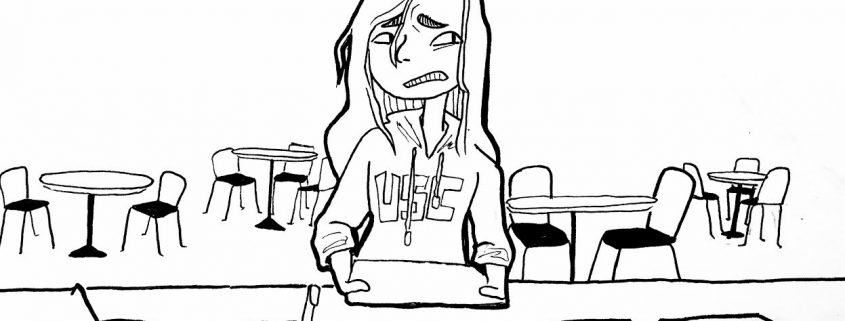Spring break policies hurt poor students
With spring break looming, many Trojans will decide whether to spend the vacation abroad, at home or on campus. For some students, this decision is financially motivated. Many low-income students are unable to afford traveling home over spring break, and in order to support students of all socioeconomic statuses, the school must at the very least make food available to students who lack the privilege to leave campus for spring break. With the dining halls shut down for the entire week of spring break, USC is blatantly ignoring those who do not have a choice. Additionally, freshmen from low-income backgrounds, who by this, as they lack experience living without a meal plan, will be most affected.
USC is notorious for its high tuition costs. While the University has attempted to combat these fees with scholarships and financial aid, the fact remains that USC is very expensive to attend. In a sustained effort to increase social and economic diversity, however, USC has made substantial steps toward making college more affordable for low-income and low-opportunity students.
Twenty-one percent of students receive merit-based scholarships from the University, and more than two-thirds of students receive financial aid. A study from The New York Times favorably ranked USC among other elite schools for accepting students from all economic backgrounds, and the average household income for an admitted student at USC is lower than at comparable schools. Regarding cultural and social diversity, 24.1 percent of students are international, a fact USC is proud of. These on-paper statistics all show an upward trajectory for the goals that the University is attempting to accomplish.
However, the truth remains that for day-to-day student life, Trojans are not receiving the proper support for the amount of money students pay — and the fact that dining halls will not be available over break underscores this.
Throughout the week of spring break, without access to the dining halls students pay for in required meal plans, students who cannot afford to travel and leave campus will have to buy their own food from local grocery shops and restaurants. The economic burden of providing one’s own meals despite having already paid for a meal plan may be insignificant to some students who choose to stay on campus over break, but will dramatically and disproportionately affect those who lack the economic means to travel or are already food-insecure.
Many of the previously mentioned scholarships simply lower tuition, but do not address students’ needs in terms of books, food, housing and leisure expenses. Freshmen are required to purchase a $5,700-plus dining plan that ultimately fails to cover nine days spent on campus during the spring semester. Although students have access to dorm rooms and USC-owned apartments throughout the break, food costs within the area are not insignificant, and this economic burden is a lot to shoulder, especially for freshmen who are less likely to be employed, and probably have less money saved than upperclassmen.
The majority of housing units on campus do not have kitchens, so cooking food is nearly impossible. The only other option as a freshman on campus is to purchase non-perishable, easy-to-prepare food from a nearby grocery store or eat out two to three meals per day for nine full days. This forces students who can already barely afford to attend the University to spend more money and eat unhealthy diets. At a school with the 10th highest tuition in the world, in a city where the cost of living is one of the highest in the United States, food should be the bare minimum of what is granted to all students.
Instead, tuition keeps increasing, leaving students in the dark for what exactly their money pays for. At the very least, the press release regarding a 3.93 percent increase in tuition should have addressed some of the daily problems that lower-income students face. The University is on track to meet its $6 billion fundraising goal, and was under-budget in construction of USC Village. If the University lowered the cost of food, bookstore textbooks or even housing, which it is more than financially capable to do, then the school would be more accessible to lower-income students.


This article is full of unrealistic fantasy. This author wishes the books were cheaper. food were cheaper, housing were cheaper, and, most importantly tuition were cheaper. you think everything you can get access to should be cheaper and the university should pay for all of these for you. If some students can’t afford some of the money, hey, USC should pay for it. And, USC has to accept more poor students. Wow, the logic! I am very disappointed at this pointless article.
And if the author is a low-income student herself? Individuals shouldn’t have to fill in because institutions don’t yet have viable solutions to fix the problems they create.
There are plenty of low cost meal options in the surrounding neighborhood. Or perhaps bring one or two students home with you for the week. Practice what you preach. You’ll learn far more from doing that than just writing an op ed piece.
Very nice sentiments. Why don’t you invite some poor kids to spend Spring Break at your home? You already did? Good. You are a kind person!
Respectfully, people like you only enable oppression. Your response is unfortunately the same generic response that could literally be applied to any argument in the history of arguments – you must realize how terribly uncreative you sound?
By your logic, anytime a first party oppresses a second party, a third party MUST be silent unless the third party successfully remedies the oppression of the second party. In other words, you prefer to allow the first party to continue to oppress. Literally makes no sense :/
I’d also like to point out the journalist may very well have done exactly what you proposed – could you provide evidence he/she did not? Thanks!